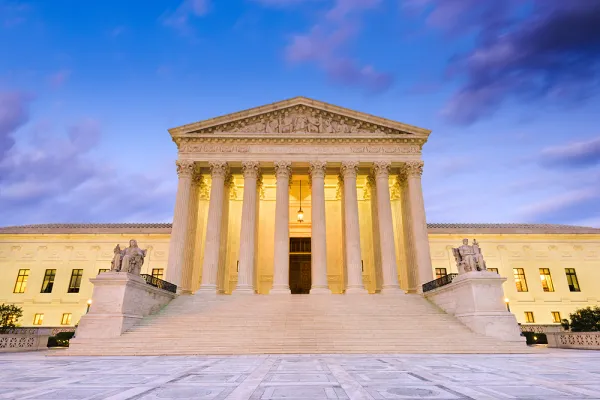Smith Signs Amicus Briefs in Supreme Court Case
News of Note

Published December 22, 2015
In December, the U.S. Supreme Court heard arguments in the case of Fisher v. University of Texas Austin, a case concerning the affirmative action admission policy at UT Austin. Smith signed two amicus briefs in support of the University of Texas.
The first brief, submitted by 38 colleges and universities, argues that private, highly selective colleges have a compelling educational interest in enrolling broadly diverse (including racially diverse) classes, and cannot do so without taking the diversity they strive for into account.
The second amicus brief, submitted by the College Board and the National School Boards Association, argues that the Court should affirm that 21st-century education goals are consistent with efforts to advance economic success.
Dwight Hamilton, chief diversity officer at Smith, and Audrey Smith, the college’s vice president for enrollment, talked recently about the amicus briefs.
Why is Fisher v. University of Texas important to Smith?
DH: “We don’t know what or how far reaching the Court’s decision might be. It might be fairly narrow, focusing only on the University of Texas’ admission policy, which is fairly unique. But that outcome seems unlikely. It is more likely that the Court’s ruling will be broad and encompassing. If the Court does decide broadly, the Fisher case could adversely affect admission practices at colleges across the nation, including Smith.”
AS: “Many people assume that private colleges will not be affected by the Fisher v. University of Texas case, but this is incorrect. Although Fisher involves a challenge to a public university’s admission policy, the upcoming Supreme Court opinion will likely have implications for private college and university admission practices as well. As recipients of federal funding, private institutions—like Smith—must comply with Title VI, which prohibits discrimination on the basis of race. The legal principles of Title VI, which apply to both public and private institutions, are identical to federal constitutional principles, which apply to public higher education institutions. Thus, the Court’s analysis and holding in Fisher will apply equally to both public and private institutions of higher education across the country.”
Why did Smith decide to sign these two amicus briefs?
DH: “The Supreme Court, although acknowledging that a diverse student body is necessary in higher education, is deciding whether the University of Texas may consider an applicant’s race, not in a preferential manner, but as part of its holistic review of that applicant. We believe colleges and universities should be able to consider race as part of looking at the whole individual—in the same way that we look at their participation in a sport, for example, or their commitment to public service. And although Smith isn’t a named party in this case, we do want to support the institutions that share our goal of having a diverse student body.”
AS: “Smith practices holistic admission. That is, when we make our admission decisions, we look at all aspects of the student. While the student’s academic record is by far the most important admission factor, we also consider extracurricular involvement, special talents, and the circumstances in which the applicant has grown up and attended school. Since we consider all aspects of a student’s personal and academic life, it’s important to consider race, which could well be a very important component of an applicant’s identity.”
What role will amicus briefs play in the Supreme Court’s deliberations?
DH: “In any Supreme Court proceeding, groups that aren’t party to a case may file an amicus curiae brief, or literally ‘friend of the court’ brief, to provide information that they believe the Court should consider before reaching its decision. The Fisher case may adversely affect Smith’s ability to attract a diverse student body. Accordingly, we think it’s important to weigh in up front.”
If the Court doesn’t side with the University of Texas, how will Smith continue to uphold its commitment to diversity?
DH: “I come from Michigan, which severely restricted the ability of its public colleges and universities to consider race by constitutional amendment in 2006. When this happened, Michigan colleges and universities experienced significant declines in enrollment from students of color. So, in my experience, it’s very difficult to repair racial disparities in representation using exclusively race-neutral methods. If the Supreme Court decides against the University of Texas—and, more broadly, against the consideration of race in admission—Smith will have to be even more aggressive and creative in our outreach to students of color, within the boundaries of the law.”
AS: “Smith is committed to enrolling a diverse student body. We have secured outside counsel to review our existing admission practices, and we know that we are in compliance with the law. Should the legal climate change, we will again review our practices to ensure that we are doing all we can to achieve our mission within new legal boundaries.”
Why is diversity important to Smith?
DH: “The Supreme Court has long recognized that diversity is a compelling governmental interest because it enhances education. Research has consistently supported that finding. But beyond that, having diversity in faculty, staff and students is an essential part of our mission and values as an institution. If we are to truly ‘prepare women for the world,’ our campus must reflect the world.”